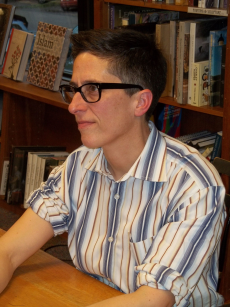
As a modern woman, attempting to make her way in the world she still feels the shadow of her parents consuming her life. Due to this illusion of an archetypal family her father was trying to create, he also manages to convince Alison Bechdel of this illusion. As a result, when she discovered the truth, she found that much of her life had been a bed full of lies and deceit, describing it as “an abrupt and wholesale revision of my history.”
Through the creation of this illusion and Bechdel’s discovery of her Father’s actions her identity is put paradoxically into a position of confusion and clarity. This is because whilst she now has to make sense of her past childhood, the revelation about her father’s homosexuality explains the nature of her own sexuality in the present. She now is able to relate her identity to her father’s.
Bruce Bechdel’s similarities to The Great Gatsby and Post-Modernsim
Bechdel mentions that her father had a fascination with F. Scott and Zelda Fitzgerald and from this she draws comparisons between Bruce Bechdel and the equally tragic character of James Gatz from F. Scott Fitzgerald’s The Great Gatsby, stating, “Gatsby’s self-willed metamorphosis from farm boy to prince is in many ways identical to my father’s.”
Both characters are wealthy and own a large house. However, unlike Gatsby, Bruce Bechdel has a family. But like Gatsby, the aesthete and beauty of the image they propagate is marred by one factor. Whilst Gatsby is without Daisy Buchanan to complete his dream set of fast car, big house and trophy wife, Bruce Bechdel has to deny his homosexuality. Consequently, he reaps little joy from a family that he feels should not be his. Both wish to achieve a dream which is out of their reach due to forces they can’t control and so they are both forced to live in an illusion of contentedness, which for both characters arguably helps lead to their deaths.
As Bechdel puts it, “Like Gatsby, my father fuelled this transformation with ‘the colossal vitality of his illusion.’” Yet despite the many comparisons Bechdel draws to modernist fiction, such as “The Great Gatbsy” and “Ulysses”, her graphic novel contains strong elements of post-modernism.
These are shown largely through her diary entries which are replicated into Fun Home’s comic strips. In them we see that Bechdel feels she can’t be certain about anything, not even her own perceptions, “All I could speak for was my own perceptions, and perhaps not even those.” This uncertainty is most seen in the images of her diary, in which before statement there is an “I think”. This element of a post-modern attitude is emphasised by how small the ‘I thinks’ are on the page in comparison to rest of her writing. It is as if her unsureness is unsure of itself.
Overall, Alison Bechdel’s Fun Home is a brilliant graphic novel. It is engaging, funny, thought-provoking and can be read in the course of an afternoon. A truly innovative and original autobiography.
Image: By Michael Rhode (101_3633 Alison Bechdel) [CC BY 2.0 (http://creativecommons.org/licenses/by/2.0)], via Wikimedia Commons

0 Comment:
Be the first one to comment on this article.